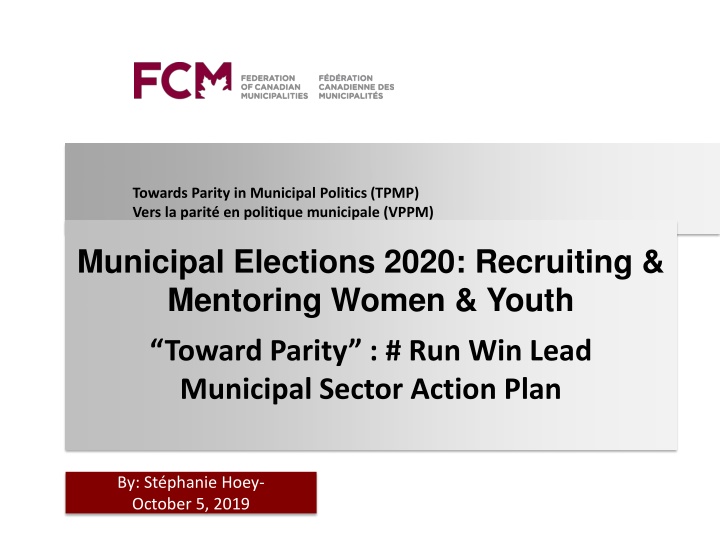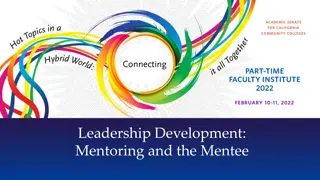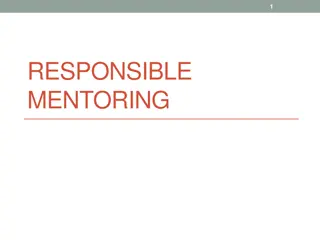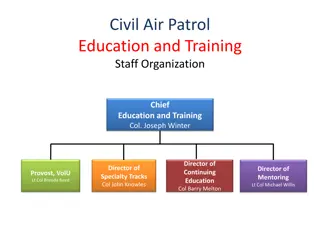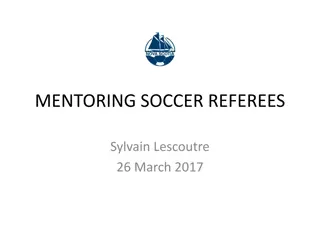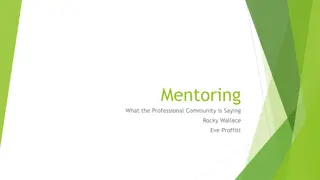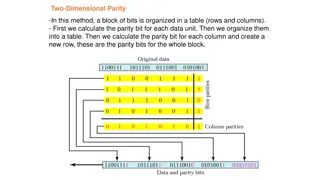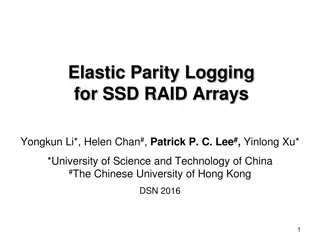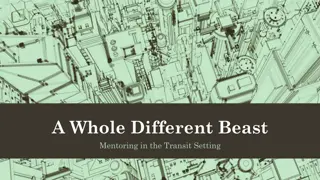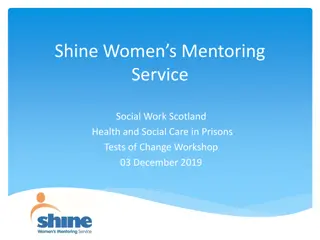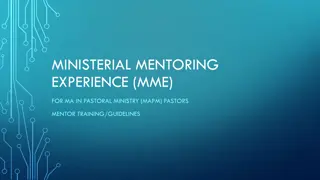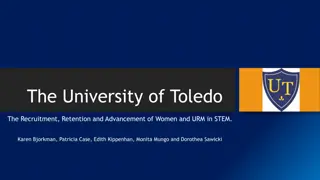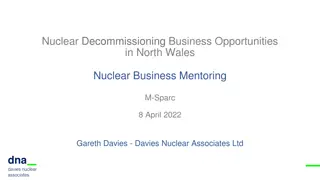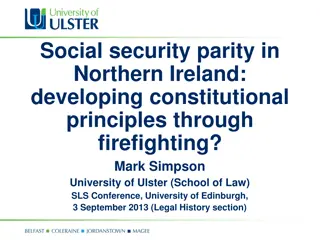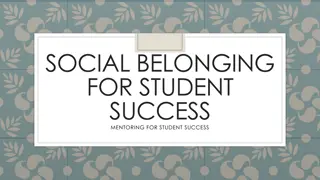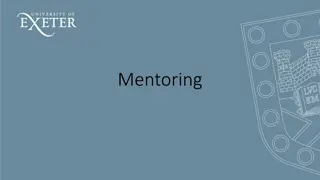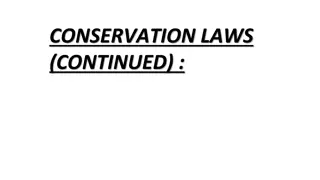Toward Parity in Municipal Politics: Recruitment & Mentoring Women & Youth
Initiative aimed at achieving gender parity in municipal politics through recruitment and mentoring of women and youth. Project funded by Department for Women and Gender Equality, focusing on consultation, action plan development, demonstration projects, and knowledge sharing. Vision to establish gender parity in municipal government across Canada. Four thematic pillars include access to information, enhanced inclusion, increased support, and improved governance and structure.
Download Presentation

Please find below an Image/Link to download the presentation.
The content on the website is provided AS IS for your information and personal use only. It may not be sold, licensed, or shared on other websites without obtaining consent from the author.If you encounter any issues during the download, it is possible that the publisher has removed the file from their server.
You are allowed to download the files provided on this website for personal or commercial use, subject to the condition that they are used lawfully. All files are the property of their respective owners.
The content on the website is provided AS IS for your information and personal use only. It may not be sold, licensed, or shared on other websites without obtaining consent from the author.
E N D
Presentation Transcript
Towards Parity in Municipal Politics (TPMP) Vers la parit en politique municipale (VPPM) Municipal Elections 2020: Recruiting & Mentoring Women & Youth Toward Parity : # Run Win Lead Municipal Sector Action Plan By: St phanie Hoey- October 5, 2019
Parity - Year 2126 ? Global gender gap will take 108 years to close and economic gender parity will take 202 years to achieve In 2015 a record 88 seats = 26.9 % seats which in 2019 puts us 61st globally Municipally, in 2015, women accounted for 28% of councillors and 18% of mayors
Overview of the Toward Parity Project Funded by Department for Women and Gender Equality (formerly SWC) over 30 months Implemented by FCM - In partnership with Equal Voice, Canadian Women Foundation and the Provincial Associations Builds on past projects and current momentum
Deliverables 1. Broad consultation 2. Development of an Action Plan/ Strategy 3. Implement demonstration projects 4. Knowledge Hub - to share tools, strategies, best practices and case studies
Consultations conducted 8 80% women 19.8% men .2% non binary webinars 10 provinces 1 territory 30 12 focus group discussions 4 consultations conference workshops 850 respondents 8 47 % Urban 53% Rural 81% English 19% French surveys
Toward Parity Action Plan # RUN WIN LEAD Municipal Sector plan for Achieving Gender Parity in Municipal Government VISION FCM envisages a Canada in which parity in women s representation from coast to coast to coast in municipal government becomes the new norm. Our vision is one in which women of all identities, and at a rate equal to that of men: RUN for elected municipal office WIN their campaigns LEAD on issues of importance to their constituents.
Toward Parity Action Plan Four Thematic Pillars of Action - 1) Access to information 2) Enhanced Inclusion 3) Increased support 4) Improved governance and structure
Toward Parity Action Plan 1) Access to information Comprises all the gaps in information that exist from tools, best practices, and knowledge about running a campaign to the data gaps and misinformation that persist about the roles and responsibilities of local government 2) Enhanced Inclusion Is looking to address a number of societal barriers including but not limited to disparities due to gender, race, age, economic status/standing. The inclusion theme also tackles key issues such as intimidation, harassment and exclusionary norms and processes.
Toward Parity Action Plan 3) Increased support Entails the steps, mechanism and process that could be put in place to ensure that all women have support to overcome barriers or balance out additional burdens that exist as a result of their gender. This includes familial support, access to mentorship or work place accommodations 4) Improved governance and structure Captures the policies, structures and broader relationships with stakeholders that will allow for more informed and reflective decision making for the community.
Toward Parity Action Plan 3 Prioritized areas for intervention A. Mentorship and encouragement B. Breaking down informal networking and decision making C. Improved access and sharing of information
Toward Parity Action Plan 1st Priority Mentorship and encouragement 1.1 Provision and space for formalised mentoring and accompaniment 1.2 Peer and thematic based mentoring 1.3 Engagement of men 1.4 Building pipeline of candidates and leaders
Toward Parity Action Plan 2nd priority Breaking down informal networking and decision making From the Inclusion Pillar 2.1 Engage stakeholder in the process to advocate against and dismantle informal decision making 2.2 Addressing perpetuation of exclusionary type behaviour by all demographics 2.3 Actions to address unconscious bias and stereotypes 2.4 Increased social and cultural sensitization
Toward Parity Action Plan 3rd priority Improved access and sharing of knowledge 3.1 Redressing information gaps at all stages; from attracting potential candidates; running successful campaigns and transitioning into the elected role 3.2 Increased dissemination and sharing of existing tools 3.3 Active programs to increasing awareness and positive perceptions of municipal politics 3.4 Collection and sharing of data
Mentorship and Encouragement 1.1 Provision and space for formalised mentoring and accompaniment -Set up formal mentorship networks of women mayors and councillors (to be implemented at the council, regional and/or national level) - Facilitate training and mentorship workshops and seminars for both mentors and mentees (to be implemented at the council, regional and/or national level) 1.2 Peer and thematic based mentoring - Create peer mentor or thematic groups where women can connect (For example, councillors from rural agricultural based communities or mining communities across different convene meetings together and discuss similar realities) (regional and/or national level) - Promote members who are taking leadership roles or addressing diversity and inclusion in innovative and engaging manners (to be implemented at the council, regional and/or national level) 1.3 Engagement of men -Engage male leaders who want to be mentors for women councillors and/or mayors (to be implemented at the council, regional and/or national level) - Actively make space for women during council and committee meetings (to be implemented at the individual and local level) 1.4 Building pipeline of candidates and leaders -Support girls learning from an early age: make yourself available for school presentations, or get involved with Girl Guides (to be implemented at the individual and local level) - Celebrate successful women leaders, especially those of colour, religious or cultural minorities, indigenous and other groups to highlight positive examples regionally and nationally (to be implemented at the council, regional and/or national level)
Breaking down informal networking and decision-making 2.1 - Identification of advocates and spokespersons (male and female) on the value and positive contributions of a gender diversified council (to be implemented at the individual, local level, regional and national levels) Engage stakeholder in the process to advocate against and dismantle informal decision-making - Build, recruit and identify future leaders of varied backgrounds and identities(to be implemented at the individual, local level, regional and national levels) 2.2 - Municipalities to create Women's Advisory Committees to reach out to the communities (to be implemented at the individual, local level, regional and national levels) Addressing perpetuation of exclusionary behaviour by all demographics - Training for members on how to spot exclusionary practices and how to address it in an effective manner (to be implemented at the local level, regional and national levels) 2.3 - Training on unconscious bias and how to get rid of it (to be implemented at the individual, local level, regional and national levels) - Speaker series from impressive women to better understand others experiences, impact and opportunities (to be implemented at the regional and national levels) Actions to address unconscious bias and stereotypes 2.4 - Actively seek new people in the community to help on committees and community groups (to be implemented at the individual, local level, regional level) Social and cultural sensitization - Provide succession plans and best practices to recruit women (to be implemented at the regional and national levels)
Improved access and sharing of tools 3.1 transitioning into the elected role - Mandatory training for individuals running for council on council roles, responsibilities, key functions, etc. (to be implemented at the local level, regional level) Redressing information gaps at all stages-- from attracting potential candidates, running successful campaigns and - realistic sense of how to be effective (to be implemented at the local level, regional level and national level) Mock council meetings with relevant issues to walk potential candidates through a meeting to increase familiarity and 3.2 Increased dissemination and sharing of existing tools Knowledge hub - Online surveys and interviews for former advisory body members to ask them about barriers they saw and suggestions on how to make it easier for women of visible minorities to become members(to be implemented at the local level, regional level) - Share existing models easier to secure buy in if a municipality can show or learn from another municipality (to be implemented at the local level, regional level) 3.3 Active programs to increase awareness and positive perceptions of municipal politics - Funding for ongoing training and require councillors to earn a certain number of learning or training credits each year and ensure that relevant learning opportunities are easily accessible (to be implemented at the local level, regional level) - Conduct an analysis of the different campaigns nationally and international to create a platform of best practices and tools to share before municipal elections (to be implemented at the regional level and national level) 3.4 Collection and sharing of data; Informed decisions are based on knowledge and data; unfortunately globally there is a lack of data about the participation of women in local government. In order to have effective solutions for women in local government better disaggregated data collection is required. - Collect information, by gender, ethnicity, and identity to better showcase the gaps and how to address them (to be implemented at the regional level and national level) - Run a positive image campaign addressing negative PR issue regarding the role s of mayors and council (to be implemented at the regional level and national level)
Annex A - Potential actions and engagements Individual Level Municipal or Council Level Provincial or Regional Level National Level Online training programs on key skills; including impactful communication, conflict resolution etc. Share and seek out new perspectives Include empathy in decision making processes Focus on strong communication between mentee and mentor Seek out mentors from alternate sectors for complimentary skills Ensure you are not mentoring or championing people just like you , look for talents in others Be willing to challenge your assumptions, to be curious about other styles, and adapt behaviors to meet others partway 1.1 Provision and space for formalised mentoring and accompaniment Set up formal mentorship networks of women mayors and councillors who will mentor For mentorships to be successful, pair women with someone from a similar size community and with similar personalities Pair new councillors with established council members in the network to create a support group Increased training and information for new councillors Set up formal mentorship networks of women mayors and councillors who want to mentor and mentees who are looking for support across the region or province/territory. Training videos and procedures to be shared online to help build practical skills (similar to minor hockey training for coaches) Host mentoring workshops to give current elected officials the skills they need to mentor women effectively Facilitate seminars on mentorship Mandatory workshops that speak to good governance and respectful workplaces Set up formal mentorship networks of women mayors and councillors who will agree to be a mentor across the country. Provide regional entities a roadmap to improve women s representation Implement national mentorship programs based on municipalities size, economy base or other characteristics Organise a women s caucus before elections
Next Steps and Timeline Action Plan (FCM Board - March 2020) Demonstrations Project Implementation Oct May/June Webinars Engagement of Regional Champions Ongoing support and engagement Launching of a Knowledge hub tools, case studies, best practices and resources
Thank you for your support and engagement If you have questions or comments please do not hesitate to contact Stephanie at Shoey@fcm.ca
